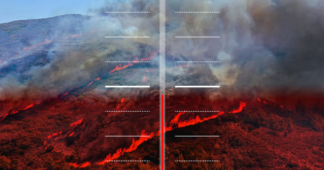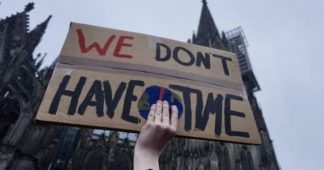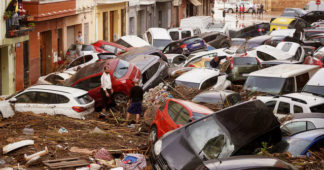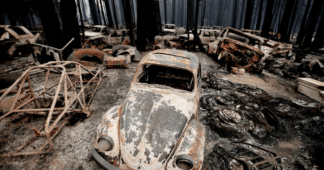Any time we use to debunk the irrational ideological arguments of privileged people in privileged societies is time lost for serious exploration for how to respond to reality.
By Jem Bendell*
Dec 15, 2024
During my past career working on various public concerns, in research, advocacy, politics and business, I saw how there’s always some difference between what is said or written in public and what is shared in private. When we are speaking privately, we can disclose more about our feelings, our doubts, and our provisional ideas. That’s because we don’t worry as much about potential reactions or defending ourselves from criticisms. That is probably one reason why private surveys of climatologists have told us that they regard our situation as worse than what the official reports indicate. It was with this in mind, that I was interested in what I would hear from the climate scientists I met face-to-face during the past year, as I visited countries to promote translations of my book Breaking Together. I noticed three significant shifts in the way most of them spoke about our situation, as well as three narratives which I believe limit their full acceptance of the situation that the latest climate science is describing for us. I will share my thoughts on these, with the aim to help scientists and those of us who discuss policy implications with them.
Looking back on my conservations during 2024 with climatologists in Mexico, Australia, USA, Belgium, Switzerland and Germany, I noticed three significant shifts in framing the situation. The first, is that most of them talked about climate change as a predicament to manage rather than a problem to be solved. Within that perspective, there is an acceptance of failure to curb atmospheric concentrations of carbon in time, and that disturbing impacts are already upon us and will become worse – whatever we do now. Previously, there was a concern that admitting such a situation might mean focusing on adaptation instead of committing to reduce emissions and draw down carbon from the atmosphere. However, now that the impacts are so obvious, reality has moved the conversation forward. Related to this shift in perspective is that no climatologist I met believes the hypothesis that global average temperatures will stabilise after net zero emissions are reached worldwide. That hypothesis was based on creative interpretations of very limited and unrealistic computer modelling. Now that the planet is absorbing less carbon than assumed by those models, it is beyond doubt that any climatologists who cling to the story that ‘netzero solves climate change’ are living in a virtual world of flawed models that ignore highly salient factors.
The second significant shift that I noticed involves an admission that climatology cannot be so confident of its approach to modelling for the assessment of risk and future pathways. The changes in global climate over the last 2 years are beyond what was projected by the models that were incorporated into the mainstream assessments and the IPCC. The last five years where top climatologists chose to ignore the models that calculated higher climate sensitivity to CO2, and thus predicted more rapid temperature rises, is now seen as a subjective choice, which comes on the back of decades of subjective choices in the design of models and simulations (nice video summarising it). That softening of confidence that there is one truth of climatology emerging from the institutionally-chosen results of simulations, means that other approaches to assessing risk, change and response could come into play. For instance, there can be a greater consideration of the role of aerosols, forest cloud seeding and ocean health in shaping climate change (as I discussed in Chapter 5 of Breaking Together). Publicly, the admissions are not quite as deep as that, and instead seek a specific cause, like an underwater volcano, for changes framed as anomalies. But privately I heard a deeper curiosity.
This shift is related to a third, which is the clearer acceptance that we are already entering ‘unchartered territory’ for humanity with current levels of global heating. Some climatologists even mentioned this in public, on panels that I participated in. Key was the clear articulation of how current global average temperatures compare to both pre-industrial averages and the range of temperatures experienced since the dawn of agriculture. A couple of years ago, in this publication, I called for more climatologists and science communicators to stop talking about average warming of 1.5C or above without referring to what the baseline has been. By being clear that a year has been about 1.64C above pre-industrial temperature averages of 13.8C helps people put the rise in context. It is also helpful for people to hear that this is highest for tens of thousands of years, and that our agriculture didn’t emerge within the climate that is emerging. That’s because it immediately brings into question the future viability of modern societies, and civilisation more generally. That can start painful conversations about how to live into such uncertainty and disruption – ones that participants in the ‘deep adaptation’ movement have some experience in.
Avoiding the Implications?
When speaking in public about our current situation already being precarious for humanity, most climatologists remain dry and cautious in their language – something we see in the important new Climate Extremes documentary. We can appreciate that approach, as climatologists have been carrying a heavy burden of bringing their science to the public and policy makers. That science is revealing situations which naturally trigger emotions of fear, sadness, and anger, as well as the typical responses to fear, such as the distractions of overwork and numbing. Most climate scientists have not been trained or experienced in any of the relevant fields for coping well with such emotions in themselves and those around them. Therefore, I see the need for more climatologists to attend various groups and courses that support professionals in navigating their difficult emotions and avoiding habits of emotional suppression. That’s one reason why I continue to offer the course on ‘Leading Through Collapse.’
Sadly, some people, including scientists, have demonised those of us who have been closer to climate reality for some years. That created unnecessary barriers to dialogue on how to respond well in this age of climate consequences. I was reminded of that when the organisers of the conference I spoke at in Berlin told me that a couple of climatologists had refused to participate on a panel with me. That is a legacy from the demonisation that was orchestrated, in part, by those who wanted a more commercially friendly story about climate, where nuclear and renewables would save the world. They misrepresented the claims in my Deep Adaptation paper to make it seem unscientific and even racist! Their efforts may have delayed a more honest engagement with the situation, but the three narrative shifts I noticed in private conversations in 2024 mean that discussion could now progress. But whether that happens or not depends on the courage of climatologists to speak publicly in a different way.
Unfortunately, I noticed in both private and public the uttering of three narratives of avoidance, whereby climatologists avoid the radicalising potential of an honest assessment of our situation. I want to spell them out here and reply to them, so more of us can avoid these impediments and distractions to honest responses to our predicament.
Avoidance Narrative #1
“The IPCC has done a difficult job and shouldn’t be criticised for not predicting precisely what is happening at present. Neither should we blame the hardworking climate scientists who contribute to it – there is no conspiracy to downplay the situation.”
The IPCC Assessment Reports from the past decades are now wildly off the mark for current climate change. For instance, their Special Report from 2018 which claimed we had a 50% chance of staying under 1.5C if we cut emissions by half by 2030 and reached net zero twenty years after that. But just 5 years later we went over 1.5C for a whole year in 2023. Some saw that coming so tried to frame that as merely temporary (as they continue to do in 2024). Temperature anomalies were expected to reduce but October was the warmest ever for both air and sea surface. The failure of IPCC to describe what was already happening was because of the processes used, where consensus amongst a volume of research was prioritised over identification of the most salient research for understanding the real world. For instance, a study in 2017 that focused on changes in the Pacific Ocean assessed that 1.5C might be breached in 2025. They were focusing on the extremely salient Pacific Ocean, which covers half the planet and so absorbs 45% of all incoming energy. The authors of that paper, Benjamin J. Henley and Dr Andrew D. King, have turned out to be the least incorrect climatologists.
Recently, one of them confirmed to me that they haven’t been approached by the scientific community or climate journalists about why they were so unusually accurate in their assessments, and what we might learn from them now. Unless we learn from obvious limitations, then mistakes will continue to be made by the scientific community. Additionally, unless people learn about the reasons for their misplaced deference to the IPCC, then mistakes will continue to be made more broadly. Some of that deference is because most of us are too busy to look deeper. Some of the deference comes from not understanding the ‘social construction’ of fields of knowledge even though they communicate about the environment. Some of the deference comes from wanting to respect powerful institutions in society, because it feels safer that way. That is especially so for people who have been well served by deferring to authority in the past.
Some climatologists might not be widely read in the social construction of knowledge, the history and philosophy of science, the sociology and anthropology of professions and institutions, or organisational psychology. That is reflected when they interpret criticisms of their profession and peak bodies as claims of conspiracy to defraud, or as character attacks. The irony is that they are the ones criticising character when claiming people are conspiracy theorists or cynical about scientists.
It is time for more climatologists to admit the failings of their profession, publicly, as top climatologist Dr Wolfgang Knorr has done. Otherwise, the environmental profession and movement is none-the-wiser and can criticise those scientists and others who are closer to the truth than the IPCC. That can undermine engagement in radical activist and in the adaptation agenda. That is why it was sad to see two intelligent British environmental writers criticise me for deviating from the IPCC – Dougald Hine in his book and Alistair McIntosh in his – as they sought to express a respect for science. Many environmentalists read their views and, not having the time to study climatology, subsequently base their choices of narrative, strategy and projects on an inaccurate assessment of reality.
Avoidance Narrative #2
“We can’t conclude at present that there is ‘runaway climate change’ and as we don’t know ahead of time if we will definitely trigger ‘tipping points,’ therefore we can’t conclude society will collapse.”
If ‘runaway climate change’ is defined as an increasing rate of acceleration forever, then there would not even be runaway climate change on Venus. But most people understand runaway climate change as accelerating beyond our control due to self-amplifying feedbacks. Those feedbacks are already occurring, without doubt, including some that weren’t predicted for our current time, such as the recent breakdown of the terrestrial carbon sink. Acceleration due to self-amplifying feedbacks can occur even if a ‘tipping point’ is not reached, or never reached. Therefore, climate change can accelerate beyond our control even if there were no tipping points. Instead, tipping points, especially how they could cascade into each other, are pointing to a fate worse than the collapse of industrial consumer societies. That’s because they point to the possibility of temperature changes at a speed that could even threaten our species.
It would be a sad irony if the work on climate tipping points were to morph from adding to our alarm to dampening that alarm by making us downplay existing acceleration which might already be uncontrollable. Instead, the already existing momentum for change in planetary systems will contribute to societal disruptions and collapses. Why? First, because there is going to be a lot more warming, which we already know will produce major disruptions to agriculture around the world. That is because the full warming effect of increased CO2 takes decades, and the modelling that suggested climate stabilisation after a magical overnight ending of global emissions didn’t factor in methane increases, or the rapid loss of carbon sinks or the rapid loss of cloud cover over the Northern Pacific due to aerosol reduction. All of which could have been factored in if the only focus was understanding reality, rather than receiving funding to use flawed tools. The ‘locked in’ warming will be added to by inevitable carbon emissions, in a world were over 80% of primary energy generation and about half of global grain production depends on fossil fuels (see Chapters 3 and 6 of Breaking Together). Even at 1.5C above pre-industrial average temperatures we await a ‘multi breadbasket failure’ (MBBF) in maize or corn. Two degrees appears inevitable and many experts who claim it is not, were saying 1.5C isn’t inevitable just a few months ago.
The second reason why there is no sense of calm from thinking tipping points might not be reached, is the current climatic changes are amplifying the difficulties being experienced through ecological overshoot. Discussing how humans are approaching multiple ‘planetary boundaries’ has become a useful device, but could also be a distraction from how we have overshot the Earth’s carrying capacity already. Just look at the data on the collapse of biodiversity to wake up to that. Populations of wild animals have declined an average of 68% in my lifetime. So now wild mammals comprise only 4% of mammals on Earth, the rest being us, our pets and livestock (see Chapter 4 of Breaking Together).
Avoidance Narrative #3
“Change is happening and so we need more of it rather than give up.”
The needed changes are not happening and the claim that they are happening is causing more harm than good. First, let’s recognise the nature and scale of the predicament. Emissions are rising, habitat and biodiversity loss is increasing, planetary poisoning is spreading, along with reactionary attitudes and politics. Economic growth is still required of our species by monetary systems designed to control and exploit us to serve the most powerful. Despite decades of warning, climate adaptation is not happening at scale or systematically.
Second, the ‘solutions’ that are spreading are not solutions. Let’s look at electric vehicles (EVs) as one example. With just 1% of the world’s population, for the UK to drive EVs alone would use the total global annual output of cobalt. Faced with these limitations, a techno-extremist will refer to sodium-ion batteries as answering the problem. Indeed, nearly every climatologist I met in 2024 did just that! Therefore, they needed to ignore that sodium-ion batteries provide 30-60% less energy per kilo than lithium-ion batteries. As the lithium battery in an EV is typically 25% the weight of a car, sodium batteries will either make the car much heavier and more inefficient or with a far shorter range. No amount of shareholder-facing propaganda from large corporations can change that reality.
If humanity can sort out energy storage rapidly and globally, then we would still need 200 years of the annual global production of copper to switch everything worldwide to renewably powered electricity. That assessment is outlined in a peer reviewed study, which also debunks the claims that copper could be easily replaced by aluminium. As I say in my book, Breaking Together, I also hate this conclusion. For years I was lied to about the ‘green transition’. Those lies today have consequences, as they drive the situation where pristine environments are trashed and indigenous human rights crushed to extract the metals for the electric dreams and profits of the rich. No number of billionaire-funded reports on techno fantasies, framed as positive tipping points, that pay mere lip service to this concern about the impacts of mining-on-steroids, will do anything to address it. Instead, environmental experts need to decide who they wish to be in this age of consequences – an eloquent part of the industry of excuses and false promises, or something more real?
A third problem with the “change is happening just believe it” narrative of avoidance is that the positive progress is occurring in the context of a process of unfolding societal breakdown. The current situation is not the stable functioning of modern industrial consumer life. Like me, you are probably relatively privileged. We might experience displeasure at rising prices, declining savings, increasing workloads, decreasing free time, increasing debt, shrinking horizons, and increasing anxiety about the news. But the majority of people in the majority of countries worldwide are experiencing a steady decline in standard of living, such as health, for the past 5 years. The Human Development Index has gone down in 90% of countries since 2019 (Chapter 1 of Breaking Together). Total world poverty has increased since then. Some statisticians consider 5 years to be a trend. Therefore, people who claim societies won’t collapse are claiming these global trends will be reversed. The burden of proof is on them, and the only reason they don’t see it that way are the blinkers of privilege and modernist ideology. Typically, they then flip back to the ‘fake green fairytale’ that technology will deliver us from this predicament if only we believe it enough.
Any time we use to debunk the irrational ideological arguments of privileged people in privileged societies is time lost for serious exploration for how to respond to reality. The mainstream environmental sector is deluded and wasting precious time. We, the privileged, need to give up lying to ourselves for our momentary relief and instead start working on reality. Just because the future won’t look like this, doesn’t mean we need to give up trying to reduce harm and to plant seeds of the new. To assume that accepting the collapse of modern societies means to give up in general reflects a failure of imagination which helps preserve a destructive status quo.
Grounded
At various times during the past year, I wished that the climatologists I spoke to had wiser friends and colleagues. They have had a difficult job, with most being guided into a false positivity as the responsible way to communicate. I think it is from that basis that they reach towards the three avoidance narratives I heard during the year. Going forward, I hope they find more support, not just for themselves but because of their role in society. That’s because psychological research warns us that if people suppress difficult emotions, then violent attitudes can emerge. That would mean that when techno-extremism no longer quells the pain, people can turn to misanthropy and authoritarianism as false answers. That is part of the warning climatologist Dr Wolfgang Knorr has been sharing with his profession in a series of articles over the past year. If groups like the Climate Psychology Alliance, XR Psychologists and the Deep Adaptation Guides, could engage more climatologists, perhaps via groups like Scientist Rebellion, then opportunities would arise for better forms of communication in future.
Looking back on the year, I felt a duty to write this essay, as a way of trying to make my travel matter, and the carbon count. I am a reluctant traveller, as it is costly, takes me away from my life, and is bad for a couple of my chronic health conditions. For those reasons, I will not be travelling much in future. But what I was reminded of by travelling during the past year is the depth of conversation that can occur in-person. If our public pronouncements and online sharing could be as honest as we can be in private, then we might see a more rapid shift in the agenda on our environmental predicament. I will keep that in mind, as I move into a different phase of my life, focusing on more grounded activities, like developing the organic farm school here in Indonesia.
* Jem Bendell is Professor of Sustainability Leadership, University of Cumbria, UK. He has recently published the book ‘Breaking Together – a freedom-loving response to collapse’
We remind our readers that publication of articles on our site does not mean that we agree with what is written. Our policy is to publish anything which we consider of interest, so as to assist our readers in forming their opinions. Sometimes we even publish articles with which we totally disagree, since we believe it is important for our readers to be informed on as wide a spectrum of views as possible.











